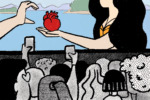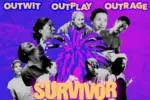Ah, Netflix. The world’s most addicting pastime. The place you go when you need a small homework break — except that “small homework break” turns into seven hours of binge-watching “Grey’s Anatomy” for the 10th time this month. Which, not going to lie, doesn’t send me into a spiral of shame like it used to.
Since this is a scenario we can all relate to, it’s easy to see how Netflix has taken over much of our lives. With its endless streaming of shows we both know and love and Netflix Originals that actually aren’t as bad as they seem, it’s too easy to fall into the black hole that is Netflix. It’s too easy to forsake all other responsibilities and instead watch one season of a show in only two days.
https://www.youtube.com/watch?v=rArqwuwS7mw
Well, like I said, this phenomenon doesn’t escape me, because this is exactly what I did with Netflix’s new original show “Too Hot to Handle.” Similar to “Love Is Blind” with its “Bachelor” vibes, “Too Hot to Handle” puts a whole new spin on the timeless classic, trapping me (and now you) in its deceptive jaws. The premise is that less than a dozen attractive singles are brought onto a beach to, more or less, sleep around.
What they don’t realize is that an Amazon Alexa-wannabe is listening to them and collecting their data, only to put a “sex ban” on them within 12 hours of stepping foot on this beach. The robot explains that she plans to help them build meaningful relationships and, as an incentive, she will reward someone with $100,000 if they are able to follow the rules. Every time someone breaks the rule, the pot loses some money. Watch as chaos ensues.
The show quickly turns from beachy paradise to a cooking pot of sexual frustration within two episodes, hooking you in like a train wreck you can’t look away from. At this point, I found the show hilarious and, frankly, a little concerning. On the one hand it was refreshing to see people panic over something as simple as a sex ban rather than a ban from seeing their dying family members in the hospital.
On the other, the premise of converting these singles from one-night standers to relationship gurus concerned, but slightly intrigued, me. Whether we choose to engage in hookups or not, is it our place to “convert” someone away from the lifestyle they independently chose? Even if this time on the beach helped them form meaningful relationships, is this premise sending a negative message about those who choose to engage in hookups?
Nevertheless, I kept watching, interested to see how this cone-shaped Siri was going to change the participants’ lifestyles, not being able to see how it would work. How was a robot going to make these random strangers form meaningful relationships with each other?
I could see how making them refrain from being intimate could force them to get to know each other and, therefore, develop deeper feelings but I didn’t see how this could be a long-term developmental journey. So, just off the first couple episodes, I deemed “Too Hot to Handle” to be “so bad it’s good.”
As the show progressed though, I saw improvement. Contestants were forming relationships, communicating with each other and breaking through personal barriers. A great deal of this was done through “workshops” that helped participants develop trust and build a positive self-image.
I saw the immediate results from these workshops, one of them so powerful that it led one of the participants to stand up to another who had mistreated her. Long term, I saw participants develop from being passive-aggressive and accusatory toward other contestants to communicating honestly and openly when problems arose.
What this showed me was that my initial assessment was dead wrong. “Too Hot to Handle” wasn’t “so bad it’s good,” it was an interesting opportunity to view the growth of complete strangers. It showed me that, regardless of whether the premise was problematic or not, personal growth can happen with a little bit of effort. It gave me hope that we could all become more emotionally healthy with the right guidance.
Now, this isn’t exactly news to some of us. As someone who has gone to therapy, I’ve experienced the power of emotional growth when the right guidance is provided. I’ve also seen this in the people around me who have done the same. Knowing this, it was nice to see a show (and a reality show no less) show this growing process.
Very rarely do we see real growth in the media. Instead, we see a teenage girl become more confident after meeting a cute boy or, even worse, a teenage girl who becomes more confident after a makeover. We don’t see real emotional growth as the difficult process that it is.
That being said, this is reality TV we’re talking about. It’s possible that some producers could be involved but, regardless, the process we see is still the same. This show is miles away from “The Bachelor,” which is laden with drama and buckets of emotional pain. It’s not scattered with eliminations, validation isn’t doled out via roses and it doesn’t end in a proposal ultimatum.
Instead, every person and couple on the show is on their own journey. Some leave before the end of the show (either through choice or the robot’s disappointment in their progress), some leave single and some leave as a couple.
Granted, money is involved. It’s clear that a few of the contestants only care about this end-result bonus but it’s also apparent that many of the contestants see the other benefits. These are the benefits that give me hope for shows in the future. Hope that we will continue to see shows that are both funny and heartwarming. That show emotional growth and realistic struggles. And that show us that even shows that seem “so bad they’re good” can actually just be flat-out good, or even great.

















